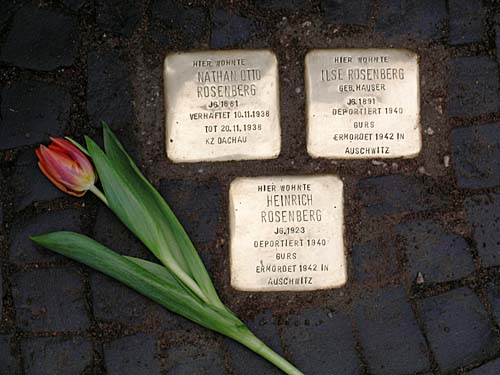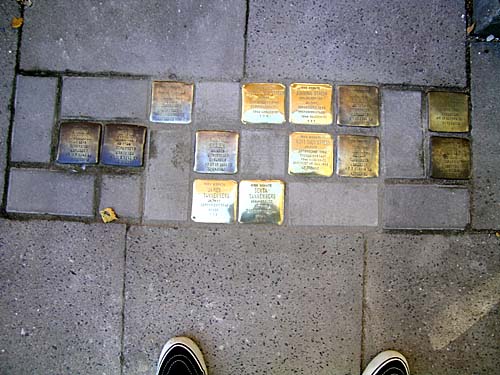On my way back to Berlin, I grabbed a copy of this week’s Village Voice at JFK airport. The Voice has long been a bastion of activist journalism, although it seems these days the editors limit themselves to one article per issue, and the rest are ads for In-Call erotic massages and psychic readings. I guess that’s the price you pay for something free </pun>.
The cover story this week was a great piece entitled The Fall of the House of Rubashkin. It describes how the kosher meat industry is ruthless, and considers itself beyond civil law.
A lot of my fellow Jews tend to look at the Hasidim, and especially the members of the Lubavitch sub-sect, as fun-loving Hora-dancing sages who are doing all of us a favor by maintaining Judaism the way we really ought to practice it. Of course, that’s a bunch of kosher baloney. Nowhere in our books does it say you should wear long black coats and a fur shtreiml hat in the hottest climates. Nor does it say women should shave their head, and then put on a wig that looks better than their own hair would have ever been.
I will not regale you with endless anecdotes of sectarian weirdness or Talmudic fringe interpretations, just know that I lived among them for several years and that I speak from first-hand knowledge. I like the way Rabbi Jeremy Rosen writes about the Hasidim:
There is a fashion of thinking that if you dress up in black Eastern European garb and look like an exotic nebbish you must be authentic and doing a great job keeping Judaism alive. Sadly, too many of these characters are social welfare cases who fortunately contribute to Jewish survival by producing lots of kids and thereby raking in the child support. But as a paradigm of spirituality are as remote from genuine Jewish values as the hordes of fighting Satmarer Hasidim who rioted in New York on Simchat Torah and had to be separated by police, and whose antics were blazed across the New York non-Jewish press.
Such Jews have brought ridicule to our noble tradition. If this is Judaism then it is the greatest desecration of God’s name imaginable. And according to Maimonides that is the greatest of sins and far outweighs such religious obligations such as eating only Hassidish glatt kosher steaks or spending $4,000 for the finest fur shtreimelach to parade around in summer’s heat to prove how much closer they are to God than ordinary Jews.
I miss Rosen. He was the only Rabbi that ever brought me closer to my religion, the others all contributed to ultimately driving me away from it to a point where I am solely a cultural Jew, not a spiritual one. Or as I described it to my wife when we first met: I’m more Deli than Synagogue.
I know that most Lubavitch disdain non-Hasid Jews (and all others too). I also know that there are as many Hasidic criminals with beards & payis as there are amongst normal society.
So it came as no surprise to me to read that one family had over the years taken control of the kosher meat butchering and distribution, and run the sweat-shop equivalent of a slaughterhouse. The company, founded by Aaron Rubashkin, is called Agriprocessors. They have a plant in Iowa, which recently got raided by La Migra. As the Voice tells it:
In May, Agriprocessors became a national news story when the federal government made it the subject of what was then the biggest immigration sweep in history, taking 389 undocumented workers into custody. The workers had been paid some of the lowest wages in the nation, and were allegedly forced to work up to 17-hour days with 10-minute lunch breaks in a freezing-cold, dirty hallway. Workers as young as 16 were said to have been operating meat grinders and power shears, often without any safety training.
The article continues by describing how Rubashkin over several years bankrupted several small businesses as they built a business worth $300 million in annual earnings (!). They perceive secular regulations as a nuisance, but have made a very nice living in the kosher certification racket. But when you read the various Hasidic blogs, the writers and especially the readers leaving comments are convinced this is an Anti-Semitic conspiracy.
Since the article was published, Sholom Rubashkin has been detained in Iowa. The prosecutors don’t want to set any bail, because they know full well he’d be on the first plane out of the U.S.A. The packed bag with passports and thousands of dollars of cash that was found on him might have been a tip-off…
Good riddance. If these are the kind of people demanding Moshiach show up now, no wonder he’s taking his time.
…not that I should care. I’m just finishing Richard Dawkin’s “The God Delusion”… It is becoming increasingly difficult to think of myself as Jewish in religious sense. Like a lot of modern secular people, it is difficult to assess what is keeping me from admitting to atheism. Part of it must be the pride I take in Jewish accomplishments. But a careful reading-between-the-lines of the Jewish Museum in Berlin proves one thing unequivocally: Jews have contributed a lot to the world since Enlightenment, but none of them were Orthodox.
One final note: On the same day I read the Rubashkin story in the Voice, the Times ran an obituary for an interesting man: Rabbi Emanuel Rackam died at the age of 98. He will be missed as a leader for all Jews, not just the missionary zealots who’s absolute certainty makes them as dangerous as any other religious extremists.












